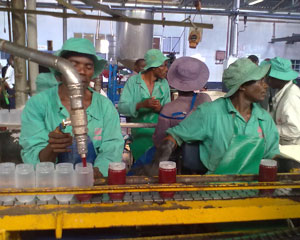
MUTARE industrial site, which used to be a hub of trade, has totally collapsed.
BY OUR CORRESPONDENT
It used to employ thousands of people and generated millions in foreign currency for the country, but it is now a shadow of its former self.
The area now resembles a junkyard with heaps of scrap and abandoned railway wagons.
A few companies, that survived the jaws of the country’s decade-long economic meltdown, are struggling to break even.
Others have scaled down operations or are embroiled in labour disputes with workers who are demanding their dues after their contracts were terminated without benefits.
Mutare Board and Paper Mills, which used to supply newsprint to local media houses and the region, is now a shell.
At its peak, the company was a source of livelihood for over 6 000 workers. Today, its offices have been turned into a private primary school.
- Chamisa under fire over US$120K donation
- Mavhunga puts DeMbare into Chibuku quarterfinals
- Pension funds bet on Cabora Bassa oilfields
- Councils defy govt fire tender directive
Keep Reading
In the giant workshop, a few indigenous mechanics carry out their private businesses.
Last week, Zanu PF politicians and local business people, under the banner of Manicaland Business Action Group, toured the industrial site on a familiarisation tour.
The delegation comprised officials from Zimbabwe National Chamber of Commerce (ZNCC), Confederation of Zimbabwe Industries (CZI), the Asian community, Manicaland Business Forum (MBF) and Zanu PF secretary for administration, Didymus Mutasa.
ZNCC president for Manicaland Chapter, Charles Tawazadza said Mutare Board and Paper Mills needed an excess of US$120 million to bring back its glory. The company also needs new partners to produce chemical rather than mechanical paper, he said.
Also visited was Cairns Holdings, currently operating below capacity due to viability problems.
Before the economic meltdown, the company used to employ over 5 000 workers, but it is now operating with a staff compliment of less than 60 workers.
Cairns Holdings operations manager, Joseph Mavu admitted that all was not well as the company was operating at 7% of its capacity.
Mavu said they had started with 92 workers this year, but 32 had since been sent home on unpaid leave by the judicial manager, Reggie Saruchera of Grant Thornton Camelsa.
Cairns, which is reeling under a US$20 million debt, has been placed under judicial management for an indefinite period. “We are facing challenges of funds for recapitalisation and buying raw materials,” said Mavu.
Mutasa said he was not promising anything but was going to ask government to assist these companies through Distressed Companies Funds (Dimaf).
Afri-Safety Glass, formerly PG Glass, is operating at 5% capacity. At full throttle, the company used to employ 400 workers, supplying glass to countries in the Sadc region.
Dick Sunduza, who is Afri-Safety Operations director, said the company needed a US$700 000 capital injection to boost production. He said their major challenge was shortage of raw materials since they were importing everything from South Africa.
“We have markets in the region and [the] United States, but we are financially handicapped,” said Sunduza.
He said at its peak, the company used to produce over 15 000 windscreens, 5 000 door glasses, and 30 000 oven door glasses for Kango per month.
obsolete equipment has now hamstrung their operations.
“We need new equipment to meet world-class standards. We have the capacity and the market is readily available, but we need financial support from [the] government,” he said.
Sunduza said they had capacity to generate US$4 million every year if government availed support urgently.
A local business analyst, Clive Thompson said reviving industries in Mutare was a mammoth task. He said government was broke and could not go it alone.
“Government should swallow its pride and reverse all populist policies that drive away potential investors,” said Thompson. He was referring to the government’s indigenisation and Empowerment programme which compels all foreign-owned companies to dispose 51% of their shares to indigenous peoples.
The closure of companies in Mutare has led to a significant number of residents resorting to informal sector trading, either at Sakubva Musika or vending along pavements in the Central District Business, playing cat and mouse with municipal police.











